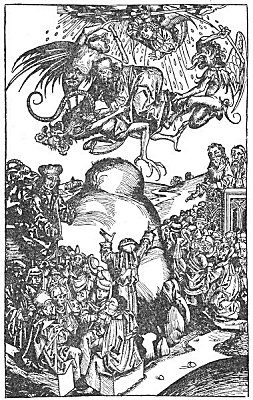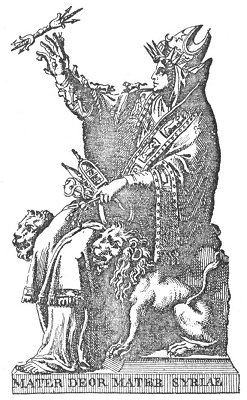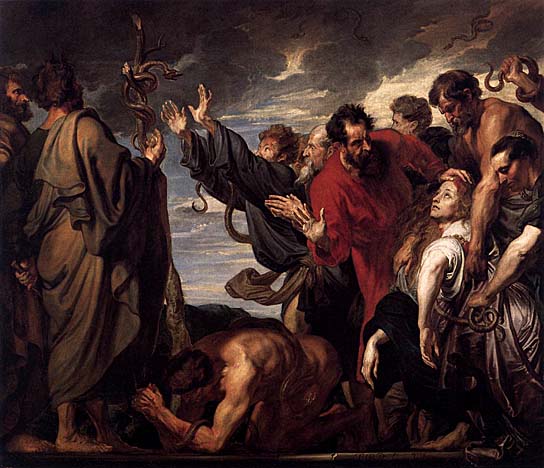As time passed on the historical Orpheus became hopelessly confounded with the doctrine he represented and eventually became the symbol of the Greek school of the ancient wisdom. Thus Orpheus was declared to be the son of Apollo, the divine and perfect truth, and Calliope, the Muse of harmony and rhythm. In other words, Orpheus is the secret doctrine (Apollo) revealed through music (Calliope). Eurydice is humanity dead from the sting of the serpent of false knowledge and imprisoned in the underworld of ignorance. In this allegory Orpheus signifies theology, which wins her from the king of the dead but fails to accomplish her resurrection because it falsely estimates and mistrusts the innate understanding within the human soul. The Ciconian women who tore Orpheus limb from limb symbolize the various contending theological factions which destroy the body of Truth. They cannot accomplish this, however, until their discordant cries drown out the harmony drawn by Orpheus from his magic lyre. The head of Orpheus signifies the esoteric doctrines of his cult. These doctrines continue to live and speak even after his body (the cult) has been destroyed. The lyre is the secret teaching of Orpheus; the seven strings are the seven divine truths which are the keys to universal knowledge. The differing accounts of his death represent the various means used to destroy the secret teachings: wisdom can die in many ways at the same time. The allegory of Orpheus incarnating in the white swan merely signifies that the spiritual truths he promulgated will continue and will be taught by the illumined initiates of all future ages. The swan is the symbol of the initiates of the Mysteries; it is a symbol also of the divine power which is the progenitor of the world.
THE BACCHIC AND DIONYSIAC RITES
The Bacchic Rite centers around the allegory of the youthful Bacchus (Dionysos or Zagreus) being torn to pieces by the Titans. These giants accomplished the destruction of Bacchus by causing him to become fascinated by his own image in a mirror. After dismembering him, the Titans first boiled the pieces in water and afterwards roasted them. Pallas rescued the heart of the murdered god, and by this precaution Bacchus (Dionysos) was enabled to spring forth again in all his former glory. Jupiter, the Demiurgus, beholding the crime of the Titans, hurled his thunderbolts and slew them, burning their bodies to ashes with heavenly fire. Our of the ashes of the Titans–which also contained a portion of the flesh of Bacchus, whose body they had partly devoured–the human race was created. Thus the mundane life of every man was said to contain a portion of the Bacchic life.
For this reason the Greek Mysteries warned against suicide. He who attempts to destroy himself raises his hand against the nature of Bacchus within him, since man’s body is indirectly the tomb of this god and consequently must be preserved with the greatest care.
Bacchus (Dionysos) represents the rational soul of the inferior world. He is the chief of the Titans–the artificers of the mundane spheres. The Pythagoreans called him the Titanic monad. Thus Bacchus is the all-inclusive idea of the Titanic sphere and the Titans–or gods of the fragments–the active agencies by means of which universal substance is fashioned into the pattern of this idea. The Bacchic state signifies the unity of the rational soul in a state of self-knowledge, and the Titanic state the diversity of the rational soul which, being scattered throughout creation, loses the consciousness of its own essential one-ness. The mirror into which Bacchus gazes and which is the cause of his fall is the great sea of illusion–the lower world fashioned by the Titans. Bacchus (the mundane rational soul), seeing his image before him, accepts the image as a likeness of himself and ensouls the likeness; that is, the rational idea ensouls its reflection–the irrational universe. By ensouling the irrational image it implants in it the urge to become like its source, the rational image. Therefore the ancients said that man does not know the gods by logic or by reason but rather by realizing the presence of the gods within himself.
After Bacchus gazed into the mirror and followed his own reflection into matter, the rational soul of the world was broken up and distributed by the Titans throughout the mundane sphere of which it is the essential nature, but the heart, or source, of it they could not: scatter. The Titans took the dismembered body of Bacchus and boiled it in water–symbol of immersion in the material universe–which represents the incorporation of the Bacchic principle in form. The pieces were afterwards roasted to signify the subsequent ascension of the spiritual nature out of form.

Moe is the founder of GnosticWarrior.com. He is a father, husband, author, martial arts black belt, and an expert in Gnosticism, the occult, and esotericism.





